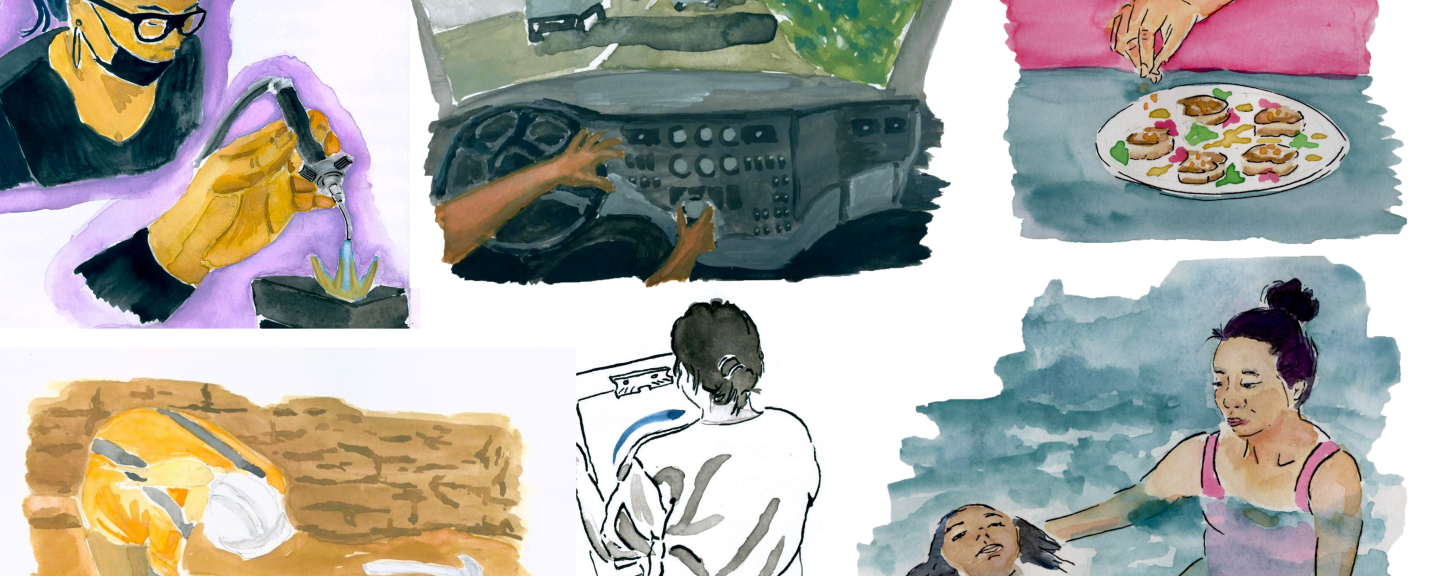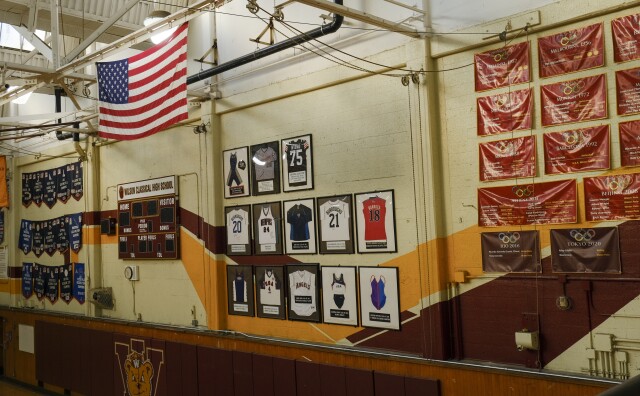
I had been thinking about making my own career change for over five years.
Some friends and I formed a group to discuss the book “Designing Your Life.” In that moment, our past decisions would no longer dictate our lives. We brought the design concept of iteration into practice, ready to learn from trial and error.
It took me time. I was terrified of leaving a respectable job and financial stability, even though I had lost a sense of vitality in my work. I sought out community college to grow my nascent interest in art and journalism.
I could be a student again — make mistakes, ask dumb questions, and dare to imagine a different future.
This is a project about six people, who by way of community college have made — or started — a leap of faith.
-
“The first stage of the career development cycle is really learning about oneself. Learning one’s personality type. What environment do we thrive in? What are we naturally good at? What are our interests? What classes have we really loved? How do we spend our free time?"
— Anne-Marie Beck, career counselor at Cypress College

Investment banker > aspiring dietician
Rita Kwan worked in investment banking for 15 years. People in Hong Kong considered it a good job for the salary and the benefits.

"I didn’t really like that at all, the so-called ‘money-making’ industry.”
She was busy with work and she didn’t have the time to think about her future.
She thought it was “normal to suffer in my job, in my life.”
Kwan’s dad was fighting cancer and she thought his poor diet might have hurt his health. In Hong Kong, she saw people eating unhealthy junk food.
She realized the importance of what one consumes.
“We have to protect ourselves by raising our awareness of what we put into our bodies.”
In Hong Kong, the opportunity to make career changes seemed limited right after high school.
Kwan came to the U.S. and took an English as a second language class at Mt. San Antonio College, where she took a personality test. Her result pointed toward a “helping” career, like a teacher or a counselor.
-
“At any stage in our career path, we should always surround ourselves with people that believe in us.” —Anne-Marie Beck

“I feel like I am a living person, instead of a person who doesn’t have a dream or who doesn’t know what I want to do.”
After taking nutrition courses at Mt. San Antonio College, Kwan plans to work full-time to afford the cost of a master’s degree in nutrition.
“Life is not about how long you live. It’s about the quality, when somebody’s healthy and able to do whatever they want to do. Like if they want to garden, they can garden. They have the health to do that, instead of staying in bed all day long.”

Jeweler > geography student
Candace Khaokham enjoyed being a jeweler, having her own creative line and her artistic pieces in galleries. “It was really rewarding and fun stuff, but it’s very taxing on your body and your eyesight because everything is so small.”
She realized she wasn’t earning enough.
“I’m getting older. I need to start thinking about a regular health care plan and savings.”
“I was looking at where people are needed in the future, you know?” A friend said there was a demand for people in the geography profession.
Khaokham attended Pasadena City College “without really knowing what I wanted to do when I started. I took my cultural geography class. I was like, ‘I love this class.’” She liked how geography is a study of “where we are, who’s around us, and how we got here.”
-
“A lot of times people feel like they have to do things that have a direct purpose for their eventual career goal, but a lot of times some of the most amazing opportunities arise just because we’re pursuing things that are of interest.”
— Anne-Marie Beck, career counselor at Cypress College

At community college in her early 40s, Khaokham excelled with a 3.9 GPA. “I wasn’t a great student in high school or my early teens, but this time I was like I’m gonna do good in school.”
“I wanted to have a job to be kind of helpful too, like if I could make a map that would help with land reclamation, a project on the history of redlining, redistricting, or gerrymandering.”
-
“There’s a level of trust and vulnerability for a student to disclose to a counselor: ‘I don’t know what I’m doing.’ Many times students don’t want to feel dumb.”
— Adrián Huerta, education professor at University of Southern California

Truck driver > aspiring occupational therapist

Before he had a stroke, Barri Bladon was working as a truck driver for seven years. The job was stressful. He was working 14-hour days, five days a week, and he neglected his health. “I ended up ballooning to like 330 pounds.”
“I didn’t have an education beyond high school. Being a truck driver was what I could do to make a decent salary.”
After the stroke, the doctor painted a bleak future for Bladon, pointing to statistics for African Americans. Bladon felt like the doctor was insensitive — his words causing more harm than good. Instead of feeling defeated, Bladon determined to get better.
During his rehabilitation process, he “met some incredible occupational therapists,” and decided to become one himself, starting with going back to school.

-
“Many folks default to engineering, medicine, business even though that might not be their natural interest. Sometimes folks don’t know what is available out there and what the labor market demands."
— Adrián Huerta, education professor at University of Southern California
“I was afraid that I wasn’t gonna be able to make it through school because I hadn’t been in years, especially having a lesion on my brain.” Bladon hadn’t taken a standardized test in years. He had no idea how many courses he might need.
“Once I got through my first semester at El Camino, I felt more confident. I would get confident with each semester.”
He also found confidence by testing out other classes, like in radiology. He says, “Don’t be afraid to try something if you think you might be interested in it, especially at the community college level.”
Bladon wanted to complete his education as fast as possible. He recommends prospective students “do your own research” on what classes are required to transfer to a university — meeting with the university counselor, for example, can help. He met with a few different guidance counselors, but found only one who was particularly helpful, who saved him from taking unnecessary courses.
Bladon’s goal is “as a practitioner, I want to show people of color that there is representation in the field because the majority of the patients that we serve are Black and brown.”

Wealth management client associate > aspiring UX/UI designer
When the COVID-19 pandemic hit, Pamela Hsiung, who had been working for a wealth management company for seven years, began to work from home.

“When you’re working remotely, you’re really reduced to just the essence of the work you do. You really just sat with the work.”
“I realized all the fun parts of work were with my co-workers.” Hsiung says she had to make a career change.
As the eldest daughter of immigrant parents, she felt family expectations led her to study finance. Hsiung wanted to pivot and pursue a more creative career in design.
“I did my homework,” she says. “I realized a lot of professors at accredited universities were teaching at community colleges for a fraction of the price.”
She started by taking the Sketching for Design class at Pasadena City College. “In the beginning everyone is really lost, but maybe the second, third week you start to get the handle of thinking a little more creatively. That’s when I realized that as long as I break these steps down into bite-sized pieces, I’ll be able to digest them and inch forward.”
“I was doing something that I really enjoyed and I had never felt that when I was working in finance.” Hsiung liked creating something of her own.
If Hsiung wasn’t being cautious, “I would love to be in something that was just purely art related.” She says the design field she’s pursuing is “still a business job.”
“I think it’s still scary. I’m not done with my portfolio, and I am moving into a completely different field. I know the tech industry isn’t great right now. I just have to persevere, and I will eventually make it.”
-
“A lot of times career changers think, ‘my 10 years in that industry are all going to waste,’ but they bring into this new career field or this industry all of these transferable skills. Age, lived experience, and experience in general can be so valuable.”
— Anne-Marie Beck, career counselor at Cypress College
Physical therapy student > chef
“Career change is pretty evident for especially my generation of millennials. We all grew up kind of like on ‘you’re supposed to do this career, stick with it for like 40 plus, 50 years, retire and then that’s it.’ People are realizing you can do so many different things.”
Marie Manalo graduated from Cal State Northridge in kinesiology — the study of human movement — and began a physical therapy program.

“We were doing water exercises with clients. I was standing there holding my client in the water and I was like, ‘wow, I really don’t want to do this. I either make this change now or I commit and figure it out later.’”
Manalo’s dad had been a sous chef and her grandma’s cooking had a strong influence on her, so she decided to look into culinary school.
Someone told her that L.A. Trade-Tech has a top culinary program. “And I wasn’t going to spend a crap ton of money going to Le Cordon Bleu or something private.”

“It’s really brave to change your career,” Manalo says, adding that not all families encourage people to change course when they choose. Manalo’s mom supported her doing what would make her happy.
The “culinary (industry) is pretty freaking intense, like mentally and physically,” Manalo says. Every day someone would shout or scream at her.
She said she was so focused on learning that she had a set of blinders on and did not notice the inappropriate behavior. She also worked 14 to 16-hour days and went three years without taking a vacation.
Manalo has stepped away from the restaurant industry now. She feels burnt out. “I think people need to understand too as you grow older the way you feel about life is gonna change.”
-
“One of the biggest things that is out of the control of many folks is the cost of living. How much is the average apartment in Southern California? If you don’t have stability or support from family that can let you be at home, be in an ADU, how feasible is it to complete your goals if you’re worried about basic needs?”
— Adrián Huerta, education professor at University of Southern California
While the journey was worth it, along the way Manalo learned something about herself that is informing her next steps.
“I thought I was gonna regret changing, but once I was in it, I was in it. Now it’s like 10 plus years later and I still don’t regret.”
“I’m trying to find that, like, unicorn job that has everything — work-life balance, intensity, passion, like all that wrapped into one. And it’s really, really hard right now to find something like that.”
Archaeologist > nurse

“I loved archaeology but I needed to make more money so that I could support myself and the family that I wanted to have one day,” Jane Mitchell says. She worked in the field for nearly a decade.
She considered continuing in archaeology in different ways. Getting a master’s degree and teaching and publishing, or working in a museum, for example.
She weighed the potential outcomes of different routes. Then, she decided to become a nurse.
For her, nursing was “the most practical, stable job you could probably find.” She said she would go from studying human remains to the living.
Making the change was “like jumping off a cliff into the water. ‘Am I really gonna start making this change? Start telling people that I’m totally turning my life around. What am I doing?’”

Classes for nursing can be in high demand, but she enrolled in physiology and anatomy prerequisites at Pasadena City College.

Mitchell said she was closer to her professor’s age.
“I had to drop any amount of pride I had to ask people sometimes younger than me, ‘how do you do this?’”
At the same time, her life experience gave her confidence to ask questions. “I feel like a lot of students don’t ask questions at all. Maybe they’ll text a question.”
Mitchell says she did tons of research on how to become a nurse.
“Do your research. Make sure you have a clear path of how you’re gonna do it, how long it might take you so you can just be ready for it and not get stressed out about surprises along the way.”
-
Anne-Marie Beck, career counselor at Cypress College, recommends the following:
-
- What are my career values, personality traits, interests, and strengths? Do they align with this new career or industry?
- Why am I doing this? A fear-based decision? A decision based on full information?
- What do I know about the career that I’m aiming to go into? How thorough and confident do I feel about my research into this field?
- Have I talked to a professional within this career field?
- Have I gone to the Bureau of Labor Statistics (BLS.gov) to look at employment information in my region?
- Have I met with a counselor or department specialist?
- Have I talked to a student who’s further along in their educational journey?
- What support have I lined up to ensure I’m successful?
- What are the transferable skills that I bring with me?
- How might the pandemic have impacted this career field? How might A.I. impact this career field?
- What is the salary expectation for how much I’m going to make? What type of lifestyle will this salary support?
Order free copies of our career change zine
This story was originally written and illustrated as a physical zine, and we would love to send you copies for free.
The zine includes everything captured in this story: Advice from career counselors, questions to ask yourself when considering a career change, and hand-painted illustrations.
Fill out the form below to order free copies for your organization, school, small business, or community (while supplies last.)
If you have any questions about the project, or would like to learn about other print products related higher education we have available, please reach out to associate engagement producer Adriana Pera at apera@scpr.org.







